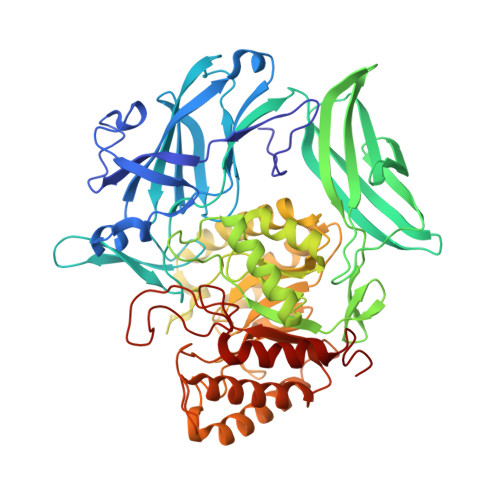Microbial enzymes induce colitis by reactivating triclosan in the mouse gastrointestinal tract.
Zhang, J., Walker, M.E., Sanidad, K.Z., Zhang, H., Liang, Y., Zhao, E., Chacon-Vargas, K., Yeliseyev, V., Parsonnet, J., Haggerty, T.D., Wang, G., Simpson, J.B., Jariwala, P.B., Beaty, V.V., Yang, J., Yang, H., Panigrahy, A., Minter, L.M., Kim, D., Gibbons, J.G., Liu, L., Li, Z., Xiao, H., Borlandelli, V., Overkleeft, H.S., Cloer, E.W., Major, M.B., Goldfarb, D., Cai, Z., Redinbo, M.R., Zhang, G.(2022) Nat Commun 13: 136-136
- PubMed: 35013263
- DOI: https://doi.org/10.1038/s41467-021-27762-y
- Primary Citation of Related Structures:
7KGY, 7KGZ - PubMed Abstract:
Emerging research supports that triclosan (TCS), an antimicrobial agent found in thousands of consumer products, exacerbates colitis and colitis-associated colorectal tumorigenesis in animal models. While the intestinal toxicities of TCS require the presence of gut microbiota, the molecular mechanisms involved have not been defined. Here we show that intestinal commensal microbes mediate metabolic activation of TCS in the colon and drive its gut toxicology. Using a range of in vitro, ex vivo, and in vivo approaches, we identify specific microbial β-glucuronidase (GUS) enzymes involved and pinpoint molecular motifs required to metabolically activate TCS in the gut. Finally, we show that targeted inhibition of bacterial GUS enzymes abolishes the colitis-promoting effects of TCS, supporting an essential role of specific microbial proteins in TCS toxicity. Together, our results define a mechanism by which intestinal microbes contribute to the metabolic activation and gut toxicity of TCS, and highlight the importance of considering the contributions of the gut microbiota in evaluating the toxic potential of environmental chemicals.
- Department of Food Science, University of Massachusetts, Amherst, MA, USA.
Organizational Affiliation:


















